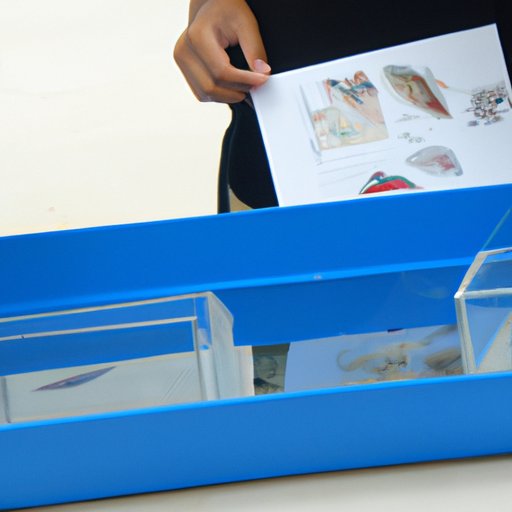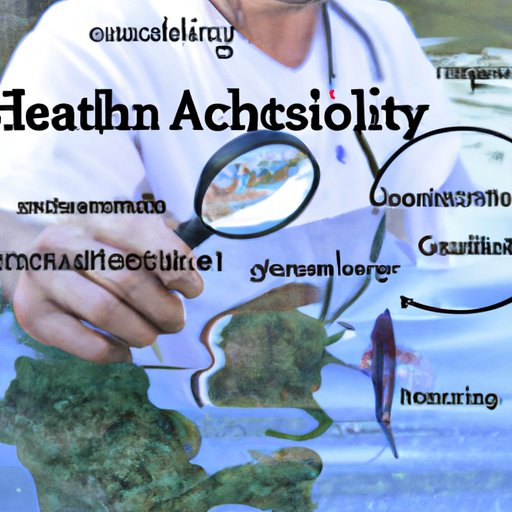Introduction
Aquatic science is a broad field of study that encompasses the different branches of oceanography, limnology, and marine biology. It is an interdisciplinary area of research that combines elements from physical, chemical, biological, and geological sciences to gain a better understanding of aquatic ecosystems and their interactions with other natural and human-influenced systems. The importance of aquatic science lies in its ability to inform conservation efforts and promote human health.
Exploring the Different Branches of Aquatic Science
Oceanography is the branch of aquatic science that studies the physical and chemical properties of oceans, as well as the organisms that inhabit them. It is concerned with the exploration and mapping of the seafloor, the circulation of currents, the composition of seawater, and the behavior of waves. Oceanographers also study the effects of climate change on ocean ecosystems.
Limnology is the branch of aquatic science that focuses on inland waters such as lakes, rivers, and wetlands. This field of study examines the physical, chemical, and biological characteristics of these water bodies, as well as how they interact with their surrounding environment. Limnologists investigate the impacts of pollution, climate change, and human activity on freshwater ecosystems.
Marine Biology is the branch of aquatic science that deals with the study of marine organisms, their habitats, and their behaviors. This field of study looks at the interactions between marine organisms and their environments, as well as the adaptations that marine organisms have developed over time in order to survive in their habitats. Marine biologists also explore the effects of human activities on marine life and ecosystems.

The Role of Aquatic Science in Marine Conservation
Aquatic science plays an important role in marine conservation efforts, as it helps us to better understand the impact of human activities on marine ecosystems. By studying the effects of pollution, overfishing, and other forms of human disturbance on aquatic life, aquatic scientists are able to provide valuable insight into how these activities can be managed and reduced in order to protect and conserve marine ecosystems.
Aquatic science is also used to assess the effects of pollution on marine life. Pollutants such as oil, pesticides, and industrial chemicals have been linked to a variety of negative impacts on marine species, including reduced fertility, altered behavior, and decreased growth rates. By studying the impact of pollutants on marine life, aquatic scientists can help inform policies and regulations designed to reduce pollution and protect marine ecosystems.
Finally, aquatic science is used to investigate the impact of climate change on marine ecosystems. As the global climate continues to warm, the oceans are becoming increasingly acidic, which has led to a decrease in oxygen levels in the water. This has had a detrimental effect on many species of marine life, including coral reefs, which are particularly vulnerable to changes in ocean temperature and acidity. By studying the effects of climate change on marine life, aquatic scientists can help inform conservation strategies aimed at protecting and restoring marine ecosystems.

Examining the Intersection of Aquatic Science and Human Health
Aquatic science also plays an important role in human health, as it helps us to better understand the relationship between aquatic ecosystems and our own well-being. By studying the link between aquatic science and human health, we can gain insights into the ways in which our actions affect the health of our planet’s aquatic ecosystems, and how we can take steps to ensure their long-term sustainability.
Aquatic science is also used to examine the links between aquatic ecosystems and food security. Many fish and shellfish species are an important source of nutrition for people around the world, and these species are being threatened by a variety of factors, such as overfishing, pollution, and climate change. By studying the impacts of these factors on aquatic ecosystems, aquatic scientists can help inform policies and regulations designed to ensure the long-term sustainability of these species.
Finally, aquatic science is used to investigate the connection between aquatic ecosystems and environmental stewardship. By studying the effects of human activities on aquatic ecosystems, aquatic scientists can help inform policies and regulations designed to ensure the long-term sustainability of these ecosystems. This includes looking at the potential impacts of development projects, such as offshore drilling, on aquatic ecosystems, as well as examining the effects of climate change on marine life.
Conclusion
Aquatic science is an important field of study that encompasses the different branches of oceanography, limnology, and marine biology. Its importance lies in its ability to inform conservation efforts and promote human health. By studying the effects of pollution, overfishing, and other forms of human disturbance on aquatic life, aquatic scientists are able to provide valuable insight into how these activities can be managed and reduced in order to protect and conserve marine ecosystems. Additionally, aquatic science is used to assess the links between aquatic ecosystems and food security, as well as the connection between aquatic ecosystems and environmental stewardship. Ultimately, aquatic science is a vital tool in helping to ensure the long-term sustainability of our planet’s aquatic ecosystems.
(Note: Is this article not meeting your expectations? Do you have knowledge or insights to share? Unlock new opportunities and expand your reach by joining our authors team. Click Registration to join us and share your expertise with our readers.)
